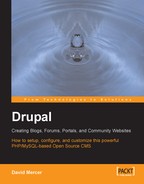Naturally, you should want to inform yourself of any and all legalities and responsibilities you have when it comes to using software developed by others. To this end, you will find that when you download a copy of Drupal, it will contain a license file for your perusal—it is actually required as part of the license that this copy be included.
If you're like me then you find it challenging to remain awake when faced with the prospect of reading through licenses and other legal documents. So, instead of subjecting you to a verbatim recount of the entire license, I will instead give you the paraphrased version that is intended to provide you with the essence of what the license is getting at as it applies to Drupal.
As odd as it may sound, one of the fundamental reasons for using the GNU GPL (General Public License) is to protect and help you—the people who use the software. The GPL is fundamentally different from the licenses of proprietary software, which by and large are designed to protect the rights of the corporate entities that developed and created the software.
Incidentally, the GPL is not tied specifically to Drupal; rather Drupal makes use of the GPL, which is a kind of generic license for distributing open-source software. You can check out the GNU home page for more information on this movement in general: http://www.gnu.org/home.html.
The way things work is that the software is copyrighted and then licensed for everyone to use freely. This might strike you as a little odd at first because what is the point of copyrighting something if you are simply going to let anyone else make use of it? The reason for this is that copyrighting and licensing the software gives the developer the power to obligate people who use that software to afford everyone they hand it out to (with or without modifications) the same rights that are vested in the original software.
What this means is that, effectively, anyone who makes use of this software cannot create proprietary software from it. So, if you decide to build upon and improve Drupal yourself in order to sell it on as your own product, then you will be bound by the same terms and will have to release your source code to anyone who asks for it. Remember though, the aim of the GPL is not to take credit for your own work by forcing you to release it under the GPL. If you have developed identifiable programs or code that are wholly your own and are independent from the original source code provided, then the GPL does not necessarily apply to your work.
A summary of some of the main points in the license is as follows:
- You are free to copy the software covered by the GPL as well as distribute these copies however you see fit. The most important thing to do is make sure you don't remove the licensing.
- You can hack around with the source code and create whatever type of derived product you want. Again, you must pass on the same license (as you received it) with the original code, only this time you must make sure you also make it very clear what changes you have made. (This is to protect the original programmers in the event you introduce a virus that destroys the Internet.)
- You mustn't break the terms of the GPL at any stage or you will find your current license to use the software terminated.
- You aren't forced to accept the conditions of the license. (You can tell this from the fact that you don't have to sign anything.) However, if you don't accept the terms of the license, you can't make use of the software.
- If you do decide to redistribute the software yourself, then you can't add restrictions or modify the license in any way. You also aren't required to ensure that the parties you distribute the software to comply with it.
- If you are compelled by a court ruling (or any other legal proceeding) to enforce conditions that do not meet the requirements of the GPL, then you must not distribute the software at all.
- Keep an eye on the version of the license that is distributed with the software. If there is one present then you must use that version or a later one, but not an earlier one.
- There is no warranty on this software, and no one who modifies or distributes the software in terms of the GPL is responsible for anything—especially damages or failure to operate and so on.
At the end of the day, if you are just going to use Drupal to build a website, all you really need to know is that it is both free in terms of price and in terms of who gets access to its source code. The cynics among you may be saying something like: This all sounds like a bunch of hooey. You can't even provide a warranty or guarantee that the software will work because no one has the money to pay for real development. Well, you don't need to worry about that. Open-source software is among the best and most reliable in the world exactly because everyone in the world can see the code and improve on it.
The only time you do need to worry about the niceties of the GPL is when you decide to set up a business installing, configuring, and customizing Drupal websites for money, or modifying, and redistributing the original source code.
